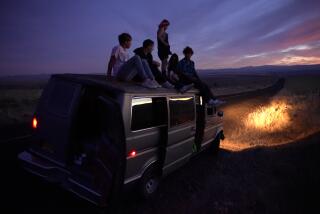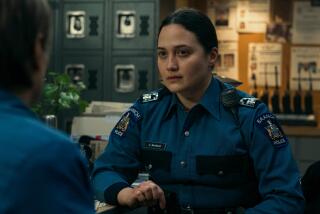Movie review: ‘Cold Weather’
“Cold Weather,” the latest micro-budget movie from writer-director-editor Aaron Katz, is like an exquisite minimalist painting — its beauty will move you, its simplicity will fool you. For there are layers and complexities to be found in the film, like the many mysteries it slowly exposes.
The opening image sets the mood, lingering on a rain-soaked window, its lovely gray blur accompanied by a surprisingly sunny tune from composer Keegan DeWitt’s richly textured original score. That soon gives way to an overhead shot of a carefully manicured apartment courtyard, empty, then entered by a guy carrying a big cardboard box. It is a good starting point for this tale of places and spaces.
Set in the filmmaker’s hometown of Portland, Ore., and something of a cautious love letter to a city that has come to symbolize ground zero for hipsters trying to figure things out, it stars Cris Lankenau and Trieste Kelly Dunn as Doug and Gail, siblings who grew up and apart. When we meet them, they’ve just begun to share an apartment as they try to navigate their newly adult relationship.
Like a trail of crumbs in the forest, Katz drops random hints rather than long exposition, so in time we learn that Doug has only just moved back to town from Chicago, is a Sherlock Holmes aficionado, once studied forensic science and thought he would grow up to be a detective. He’s gotten a mind-and-body-numbing job in a local ice-packing factory instead.
A chance encounter with his ex-girlfriend, Rachel (Robyn Rikoon), another Chicago refugee, and her subsequent disappearance pulls Doug back into the mystery-unraveling mode. At one point he even buys a pipe in hopes of finding inspiration like Holmes in the contemplative exercise of puffing out silky strands of smoke.
The case of the missing ex is set in motion when Doug’s new compadre Carlos (Raul Castillo), who toils alongside him in the icehouse by day and works the Portland club scene as a DJ by night, gets worried when Rachel doesn’t show up as promised for one of his gigs. The rest of the film follows the amateur sleuths, with Doug’s sister soon joining the gang, in the spiraling fear and bumbling fun to be had in the search for Rachel.
It is a credit to Lankenau and Dunn in particular that the relationships on screen feel born out of years together, an easiness that Katz never hurries along. Though at first glance “Cold Weather” might seem yet another mumblecore mood piece, that analogy doesn’t hold. For one thing, there’s too much attention to structure. For another, there’s the refined look of the film through the gorgeous framing of so many shots by cinematographer Andrew Reed, who collaborated with the director on the 2007 festival favorite “Quiet City.”
Reed has shot the rain-drenched streets and warehouses of Portland to maximize their linear shapes in ways that evoke the board games the siblings sometimes play. As the real cat-and-mouse game unfolds, Doug finds himself in a series of carefully crafted tight spots like the storage warehouse where he follows one suspect, with its maze of hallways to duck into and its long line of closed doors to choose from.
While the filmmaker lets time expand and scenes breathe, DeWitt’s score sets the pace with its backbeat often sounding like a pounding heart as tension rises. In fact, just about all the elements coalesce around “Cold Weather” and Katz’s clear vision of how relationships ride out life’s storms.
More to Read
The biggest entertainment stories
Get our big stories about Hollywood, film, television, music, arts, culture and more right in your inbox as soon as they publish.
You may occasionally receive promotional content from the Los Angeles Times.











